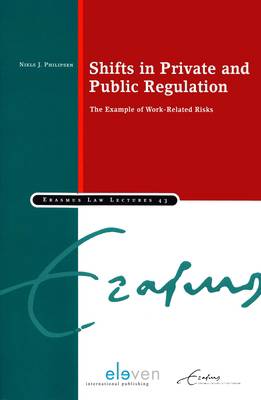
- Afhalen na 1 uur in een winkel met voorraad
- Gratis thuislevering in België vanaf € 30
- Ruim aanbod met 7 miljoen producten
- Afhalen na 1 uur in een winkel met voorraad
- Gratis thuislevering in België vanaf € 30
- Ruim aanbod met 7 miljoen producten
Zoeken


Shifts in Private and Public Regulation
The Example of Work-Related Risks Volume 43
Niels J Philipsen
€ 44,95
+ 89 punten
Omschrijving
In his inaugural lecture, Niels Philipsen discusses the (potential) role of private actors in the regulation of work-related risks, such as industrial accidents and occupational diseases. Taking the economic analysis of regulation as a starting point, Philipsen argues that a 'smart mix' of public and private regulation is needed for an optimal prevention and compensation of work-related risks. The advantages and disadvantages of various regulatory instruments are highlighted. In the lecture's second part, economic theory is confronted with some of the available empirical evidence. Do private actors really respond to shifts in regulation according to the predictions made in the theoretical law and economics literature? Philipsen addresses this question for three distinct groups of private actors: employees, employers, and (liability) insurers. On the basis of a quick-scan of the literature, Philipsen concludes that there are still several unresolved questions concerning the coping behaviour of these private actors. These conclusions take the form of a research agenda, which emphasizes the importance of empirical research. (Series: Erasmus Law Lectures, Vol. 43) [Subject: Labor Law, Public International Law, Comparative Law]
Specificaties
Betrokkenen
- Auteur(s):
- Uitgeverij:
Inhoud
- Aantal bladzijden:
- 32
- Taal:
- Engels
- Reeks:
- Reeksnummer:
- nr. 43
Eigenschappen
- Productcode (EAN):
- 9789462368217
- Verschijningsdatum:
- 16/02/2018
- Uitvoering:
- Paperback
- Formaat:
- Trade paperback (VS)
- Afmetingen:
- 165 mm x 248 mm
- Gewicht:
- 367 g

Alleen bij Standaard Boekhandel
+ 89 punten op je klantenkaart van Standaard Boekhandel
Beoordelingen
We publiceren alleen reviews die voldoen aan de voorwaarden voor reviews. Bekijk onze voorwaarden voor reviews.












